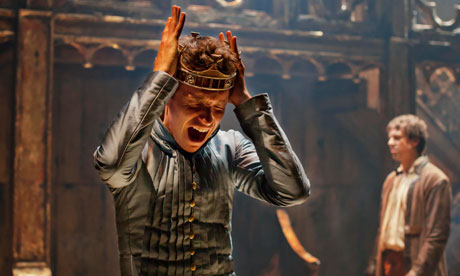The king is an effigy. In Michael Grandage's production of Richard II, Eddie Redmayne, on stage as the audience enter, is enthroned by Richard Kent's design in tarnished gilt, among sneeze-inducing clouds of incense, the glow of candles and the peal of bells. He is so much part of this ornate ecclesiastical architecture, so entrenched in a stately establishment that it is hard to imagine he could ever be deposed. He thinks that too.
Both cocky and tremulous, Redmayne captures perfectly the peculiar mixture in Richard of a man who feels born to rule but incapable of doing so; together he and Grandage unlock the difficulties of a play that is half-Henry-History, half Hamlet. His face gleaming, thin as a taper in his long cream grown, Redmayne begins by showing the lolling superiority of the head prefect who is also eaten up by doubt: a nervous smile plays around his mouth; he hesitates before some words as if about to stammer; his face twitches when his mouth announces the word "banishment". He is surrounded by sycophants. Apart from the few elder statesmen growing more wan and embittered by the hour, this court is startlingly young: there can rarely have been so many pairs of long, spindly legs flickering on to the stage to play Shakespeare. That's as it should be: the king is described as wafted by the winds of fashion, used to being flattered; when he relinquishes his regal authority he does so in a pet, as if confounded by the idea of contradiction.
Other fine performances flit around Redmayne. Sian Thomas is wonderfully clear, particular and disdainful; Pippa Bennett-Warner (a rising new theatrical hope) is velvet-voiced and wary as Richard's queen. Andrew Buchan is Redmayne's perfect foil as an apparently stolid, actually stealthy Bolingbroke.
The evening marks another parting with a crown. Richard II is Michael Grandage's final production as artistic director of the Donmar. His nine years at the theatre have been compelling. He has turned a theatre that looked brilliant because of its American dramas into one that is distinguished because of its European repertoire (no mean feat in a country that shrinks from translation). He showed that you didn't need to be the RSC to produce distinguished Shakespeare. He gave us King Lear, Caligula, The Chalk Garden. He laid his artistic vision out clearly with a team of regular, brilliant talents. Adam Cork composed sound designs that transformed plays, by suggesting what was happening offstage. Christopher Oram's designs were revelatory often when barely noticed: they spun the action along. These were Grandage's gifts: surprising dramas, smooth, clear narrative, fine visual and musical notes. It looked simple and was sublime.
Oram has also been working his magic at Sheffield, where he has created the set and costumes for Company – a fine Chrysler Building backdrop; mini lace dresses and too-tight primrose sweaters (on men). Broken-up and fractured yet full of choruses, obsessively circling around one subject, seeming to get nowhere and yet leaping to a triumphant conclusion, Company has frequently been attacked for not holding together, for not driving on through its plot. Yet the cleverness of Sondheim's 1970 musical is that this stop-and-go ambivalence is the echo of a mood. This most internal of musicals – it is never entirely clear whether any of the action happens outside the main character's head – puts on stage a state of mind, one that is quintessence of Sondheim: undercutting, shifting its view, never quite settling, mostly wanting the opposite of itself. This is exquisitely caught in Jonathan Munby's vibrant production.
Daniel Evans, artistic director of Sheffield Theatres, is Bobby, the New York commitment-phobe who is fixated on the possibility, and impossibility, of marriage. He is entirely right as the footloose but furrowed hero. He begins light and bright and solitary; he is not only in strong voice but in fleet foot, turning a full cartwheel; he ends with a swelling, open-hearted address to the audience. Caring, sharing couples advance on him like a posse with support and advice. When they sing their songs of being united, they are about to split; when they divorce, they become close. Samantha Spiro is terrific as the bride, about to be married to "my very own Jew", who wants to scuttle out of it, and almost does so, on all fours. Francesca Annis delivers the "Ladies Who Lunch" with groaning relish: she makes every note, echoed by a woodwind, that of a lush – but she also lands each shot.
In the winter of no content, farce – theatre's way of dealing with madness – is making a comeback. One Man, Two Guvnors is roaring away in the West End; a revival of Michael Frayn's Noises Off is about to open; and now comes an inspired rejigging of a venerable Ealing Comedy.
The Ladykillers rebuts the notion that screen-to-stage transfers are bound to be inert. Graham Linehan, of Father Ted, has written a script that retains the outline of William Rose's 1955 screenplay – five robbers, masquerading as a string quintet, take shelter in the house of a gentle old biddy and plan to bump her off – but that wires dialogue and characters into the 21st century. Sean Foley directs with Complicite-style panache. In Michael Taylor's shape-swivelling design the King's Cross house seems to have had a stroke: everything is lopsided, dangling; when a train passes, the tables and chairs skid around one another. At one moment a huge tunnel engulfs the stage; at another, Dinky cars race up the facade of the house.
It is hard to imagine a cast more dexterously matched to a series of smart notions. In the Alec Guinness rolling-eyed mastermind role, Peter Capaldi makes gangling look like Grand Guignol. Ben Miller seethes with newly minted Romanian rancour. Stephen Wight is a terrific spiv who pops uppers and downers when he is not obsessively polishing bits of furniture. Clive Rowe – who plays a crim apparently so big and soft that he thinks a cello can be tucked under his chin – stops the show when he breaks into beautiful song with a knife stuck through his brain. James Fleet, a major conman with a specialist interest in dainty apparel, turns his curtain call into a slinky event. And Marcia Warren, always worth travelling to see, glides around the thugs like a geisha.











